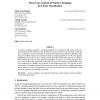Free Online Productivity Tools
i2Speak
i2Symbol
i2OCR
iTex2Img
iWeb2Print
iWeb2Shot
i2Type
iPdf2Split
iPdf2Merge
i2Bopomofo
i2Arabic
i2Style
i2Image
i2PDF
iLatex2Rtf
Sci2ools
120
click to vote
JMLR
2006
2006
Worst-Case Analysis of Selective Sampling for Linear Classification
A selective sampling algorithm is a learning algorithm for classification that, based on the past observed data, decides whether to ask the label of each new instance to be classified. In this paper, we introduce a general technique for turning linear-threshold classification algorithms from the general additive family into randomized selective sampling algorithms. For the most popular algorithms in this family we derive mistake bounds that hold for individual sequences of examples. These bounds show that our semi-supervised algorithms can achieve, on average, the same accuracy as that of their fully supervised counterparts, but using fewer labels. Our theoretical results are corroborated by a number of experiments on real-world textual data. The outcome of these experiments is essentially predicted by our theoretical results: Our selective sampling algorithms tend to perform as well as the algorithms receiving the true label after each classification, while observing in practice subs...
Related Content
| Added | 13 Dec 2010 |
| Updated | 13 Dec 2010 |
| Type | Journal |
| Year | 2006 |
| Where | JMLR |
| Authors | Nicolò Cesa-Bianchi, Claudio Gentile, Luca Zaniboni |
Comments (0)

